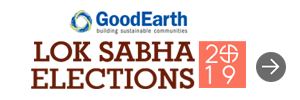Those born in the first year of the third millennium, the Y2K (year 2000) generation, have come of age. Their initiation ceremony and baptism into democracy will take place during the 17th Lok Sabha polls.
Nearly 2.61 lakh voters in the state, or a relatively minuscule 1.03 percent of the total Kerala electorate of 2.54 crore, are eligible to cast their votes for the first time in their life.
But are they ready, or even willing, to exercise their right? After the elections were announced, Onmanorama fanned across the state, visited colleges, met with first-time voters, and asked them what a vote means to them.
There was excitement but it was tempered by uncertainty, as though they were not really sure what to do with the enormous power they have been suddenly bestowed with.
"10 crore people in the country would actually be first time voters," a boy said, clearly awed by the the mighty process that will be set in motion.
Some were curious. “I have not seen a voting machine before and I am very keen to find out how it works,” an engineering student said.

But the big confusing riddle that Indian politics is can make some feel lost, too.
“What is politics and how it is run. I have no idea,” another said.
“I am not that excited to vote. Mainly because I am confused,” a girl said.
There was also hope but it was sullied by a withering sort of cynicism.
“For the time being I am voting for no one. It will be NOTA for me. All the parties are busy blaming the others. What kind of message do we get from that,” a girl in Pala said.
“After all the hype, once they come to power they fail to realise the needs of the citizen,” another said.
But there were ones who suggested that not all was lost.
“Don't look at any political party. Look at a person, at his capability, and how he can do his work,” a first-time voter in Thiruvananthapuram said.
These boys and girls, in the fag end of their teenage, also wanted to assert themselves but seemed to be held back by deep apprehensions.
“I want a government that ensures gender equality and prevents all sorts of discrimination,” a Malayali girl who studies in Tamil Nadu said.
“A candidate's previous performance will be strongly considered by me,” said an engineering student in Kollam, who is keen to make his choice felt.
A girl in Idukki said the behaviour of the candidate, too, matters.
But some, even before they could cast their vote, seem suspicious of political parties.
“None of the political parties are focusing on the real issues like jobs, economy, demonetisation, GST, flood rehabilitation, farmers issues,” a boy in Thrikkakkara said.
On the whole, it seemed as if democracy, the way it has played out in the country, has not instilled enough confidence in them.
“People are not scared after committing a crime because they are protected,” an engineering student said, hinting at the deepening crime-politics nexus. Another spoke of the parochial interests at work during elections.
“If it is a Christian or Hindu or Muslim majority area, we can see that the candidate they (political parties) are putting up will be a representative of that community that has a majority in the area. This is not fair. Such a method gives no consideration for individuality, integrity and efficiency,” she said.
The Y2K generation in the state, as they go to vote on April 23, seems more reluctant than eager.


